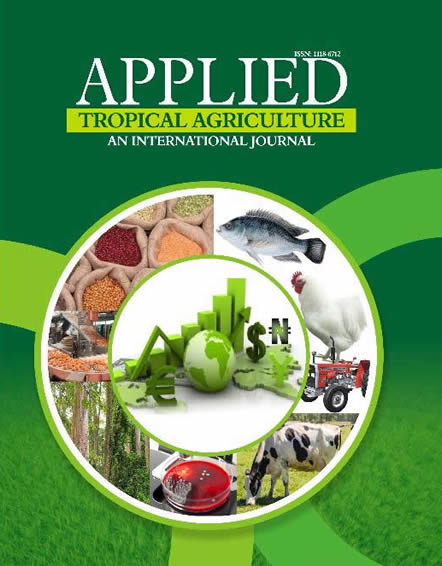The global issue that is central to attaining food security is the problem of efficiency in agricultural production. This affects the farmers' ability to optimize their farm production objectives through efficient management of productive resources. As a result, improving the efficiency of farmers will create a balance in the prevalent food supply and demand deficit, with opportunities to leverage on the surpluses for investment into more expansive production. The specific objectives of the study were to: describe the socio-economic characteristics of cassavabased farmers; estimate the profitability of small-holder cassava farmers; determine the technical efficiency of small-holder cassava farmers and estimate the elasticity of production as well as returns to scale of cassava production in the study area. Multi-stage sampling procedure was employed in the random selection of 120 smallholder cassava farmers that were used for the study. Data were collected through the use of questionnaire and interview schedule. The data collected were analyzed using Descriptive Statistics, Farm Budgetary Technique and Inferential Statistics – Stochastic Frontier Production Function. Findings from the socio-economic characteristics reveal that most of the cassava-based farmers are between the age of 40 to 49 years and that 67.5% of the farmers are married with the mean household size of 6 persons per head. The results of costs and return show an estimated Net Income of N11,908.29 per hectare, while the Return on Investment estimated is 0.04. Findings from the 2 Stochastic Frontier Function reveal that the d (0.23) and γ(0.8) are statistically significant at 5% and 1% levels respectively. The coefficient of the variance ratio (γ) implies that 80% variation in output was as a result of inefficiency differences among small-holders cassava farmers. Also, cassava stem(0.3738), farm size(0.3412) and fertilizer(0.0710) are the significant production inputs that influenced cassava output while household size(- 0.1563) and marital status(0.4706) are significantly related to technical inefficiency. The results also reveal a Mean Technical Efficiency of 0.81. Nevertheless, cassava output is proportionately less than the bundles of inputs utilized, thus indicating decreasing returns to scale. However, the study concluded that the cassava-based farmers managed to recover their expenses in production and there exist little room for improvement in technical efficiency. Relevant stakeholders in agriculture should sensitize the cassava producers on appropriate application of production inputs in order to minimize wastages
Keywords:Farming Households, Food Security Index, Livelihood, Nigeria


